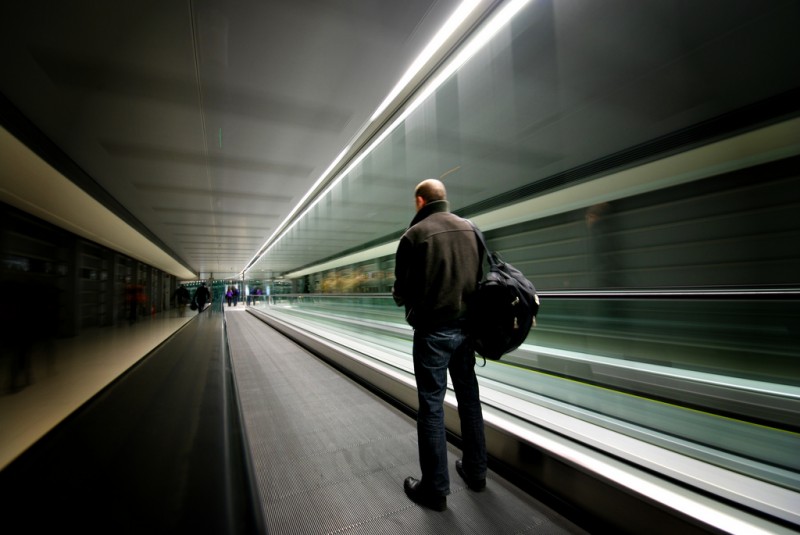There’s no shortage of road-tested and traveler-approved advice out there. For any situation, there’s a dizzying array of do’s and don’ts, try-this-but-not-that, go-here-but-not-there. Rather than overwhelm the newly-embarked vagabond, perhaps it’s best to pass along general advice that still allows for constructive trial and error and the glorious joys of ”˜finding out for yourself’.
Vagabondish is reader-supported. When you buy through links on our site, we may earn a small affiliate commission. Read our disclosure.
The following advice is by no means comprehensive, but if you’re just starting the lifestyle of drifting, floating, and otherwise exploring the world, these tidbits might serve you.
#1: The Metros Are Not Free (and don’t forget to validate)
One of my first thoughts upon alighting the Greek Metro system was, “Ah, how nice of them! The Metro is free!” In retrospect, this was not only false but also totally illegal. Metro systems throughout the world differ more than how to make a proper chili dish in America. The most important rule is to investigate before you board, so you don’t get caught with a missing ticket – or worse yet, an unvalidated ticket — and face serious penalties.
However, if overlooking this aspect of foreign travel is appealing to you, go for it — sometimes it’s almost easier to inadvertently break the rules than figure out what you need to do to get a ticket.
#2: People Who Approach You Are Not Always Doing So Out Of Kindness
First-time travelers tend to think that everyone coming at them with a smile and open arms is doing so to share the joy of travel. Not so. While there are plenty of good-hearted natives out there, some approach foreigners — and foreigners only — because their livelihood depends on it. Whether it involves steering us toward their hotel of choice (from which they receive kickbacks), convincing us to purchase tickets to some event, or offering “insider looks” at tourist sites, always use a discriminating eye and don’t be afraid to haggle and confirm prices upfront.
#3: Transportation Costs Hurt
It’s far too easy in the planning stage to assume you’ll always find free or cheap transportation like car-shares when you need them, or find the lowest-priced train or plane deal for the dates you want. In fact, if you’re operating on a tight time budget, chances are the wildly cheap train and plane deals won’t always correspond with your schedule.
While it may sometimes be feasible to plan your trip around the deals and bargains, there will come a time when you have to be somewhere by a certain time, prices be damned. And depending on what country you’re in, those prices can be staggering, especially if it means utilizing any type of high-speed rail or last-minute changes to existing plane tickets.
#4: Everything Is More (or Less) Expensive Than You Thought
Truth is, almost nobody can budget correctly for their first trip. If you’re going to Europe, things tend to be pricier than expected; while trips to Asia or Central America will be staggeringly low. It’s always best to shoot for a budget beyond what you’d expect in your worst case scenario — you know, the trip that includes unforeseen flight changes, last-minute hotel reservations, lost luggage and inconvenient thefts.
And don’t forget about the vices — whether this includes shopping, souvenirs, drinking wine every night and so on. This inevitable aspect of travel can really dent your budget if you’re unprepared.
#5: You Will Probably be Robbed
I don’t mean to say that robbery-at-gunpoint is a guarantee for world travelers, but chances are you’ll experience your fair share of petty theft along the way. It’s the way of the world and this act is not limited to specific “underdeveloped” or “heathen” countries. It happens everywhere. And if you travel enough, it will happen to you.
Always take extra precautions to ensure that if and when it does happen, you’re prepared. Stashing money in strange places and making copies of all your important documents go a long way — and having someone back home who can run important errands or forward along bank cards doesn’t hurt either.
#6: There Are Other Tourists
This means you won’t behold the glory of Rome by yourself, nor the mystical nature of the Egyptian tombs in a veil of silence or awe. There are babies crying, people sweating, pushy surges in crowds, and street vendors begging for your attention. There will always be someone in the periphery, someone waiting behind you to snap a photo, someone already in the margins of the photo you want to shoot, and so on. Television shows convey an idealized notion of solitary exploration, of quiet reverence — this is far from the truth of real tourist sites.
![Mercury II [Explored]](http://farm8.staticflickr.com/7103/7325738066_e9f706ac57_z.jpg)
Lost Tourists © ZL-Photography
#7: Plan Your First Bed
It’s easy to assume that with all the low-cost ho(s)tels out there, you’ll have multiple options for rest at night. This isn’t always the case. Depending on the season, what high-profile events are taking place or the random arrival of conventions, there’s a chance that during your visit the nearest available bed will be in a city an hour away or more.
To avoid sleeping in cemeteries or roughing it in 24-hour McDonald’s (unless, of course, that’s your goal), get your first night squared away as soon as you can. That way you can let the rest of your trip flow unencumbered by plans and commitments, which allows for the healthy, last-minute drifting between opportunities that vagabonding is famous for.
#8: Home is Where the Heart Is
When you’ve found the perfect combination of group life and location, a place for your heart and mind to settle, comfortably nourished and stimulated by your surroundings, you’ve found home.
”¦ a tired cliché to be sure, but a piece of wisdom that always rings true. Your hometown might very well be in some small (or large) city in a state that feels and looks too familiar to you, but your heart might settle on somewhere totally different than you expected.
What has become shockingly obvious throughout my years of travel is that it often doesn’t matter what language is the norm in the country, the availability of “good jobs” or whether or not a Starbucks is available ten times over in the city — what makes a place a home is the community, the connections, and the heart. When you’ve found the perfect combination of group life and location, a place for your heart and mind to settle comfortably nourished and stimulated by your surroundings, you’ve found your home. And that might be exactly the place you originally left, or it might be halfway across the world. We travelers never know until we find it.
#9: People Are Pretty Much the Same Everywhere
Overlooking religious traditions, language, styles of dress and preferred modes of transportation, it will be quickly apparent that most everyone in the world does the same thing. We all wake up, interact with family and community members, spend a portion of our days engaged in some money-making activities, eat meals amongst family members, catch up on the local happenings, and eventually go to bed. What makes travel so rewarding and interesting is the variation on the common human theme — the never-ending innovation on life.
While we’re the same, we’re also different. Some of the greatest joys on the road stem from witnessing simple interactions that we all recognize as familiar but are dripping with new colors and foreign sounds, whether it’s a tender moment between mother and child or a group ceremony in the town plaza. Travel reminds us that we’re all essentially the same, and this is one of the most thrilling lessons to learn.




